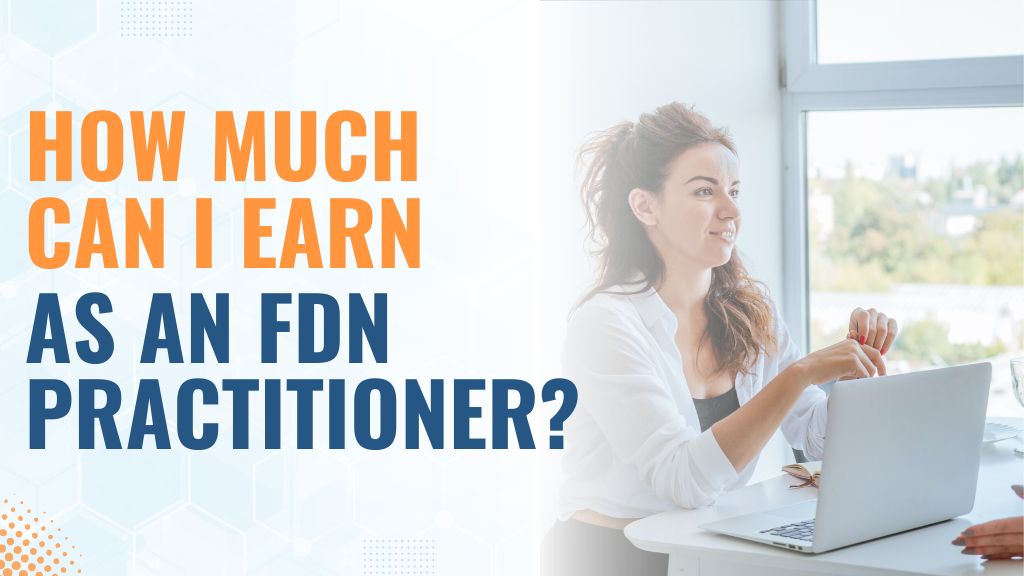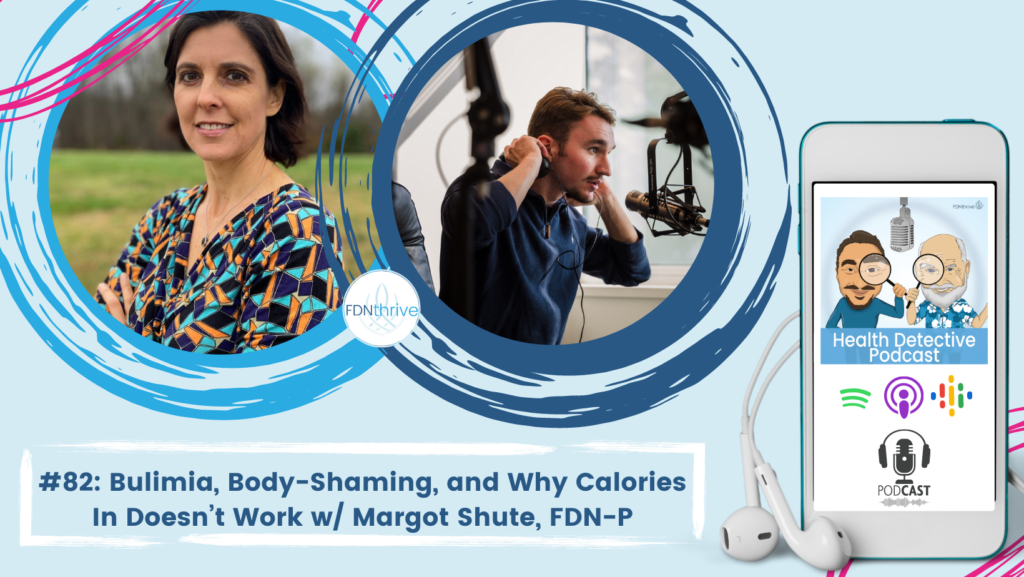
[00:00:00] Evan Transue: Welcome back to another episode of the health detective podcast by FDN thrive.
My name is Evan Transue, AKA detective Ev, and I will be your host for today’s show. As technical as we get on this show sometimes. I mean, we really bring on some people that have experienced some pretty serious diagnoses in their life in terms of like auto-immune and cancer type of stuff. It can be all too easy when we’re doing that then to forget that the vast majority, literally, statistically of people, especially in America, are dealing with weight loss problems.
And I think I would hope so. At least I think we’re past the point in the functional space where we are falling for this calories in calories out kind of dogma because we know that there’s more to it than that. But it’s amazing to me, how many people I still see on Instagram and Facebook and whatever, or YouTube, whatever social media platform shouting from the rooftops that if you cannot lose weight, it is as simple as you eating too much. I just don’t buy it whatsoever. And neither does Margot Shute, who is our guest today, and she’s a certified holistic health and Functional Diagnostic Nutrition Practitioner.
Margot empowers midlife women to shed stubborn pounds and shrink belly fat using her signature midlife weight loss fix for women, very appropriately named, right. And this is so that they can regain their energy, get their sexy back and learn to love their bodies.
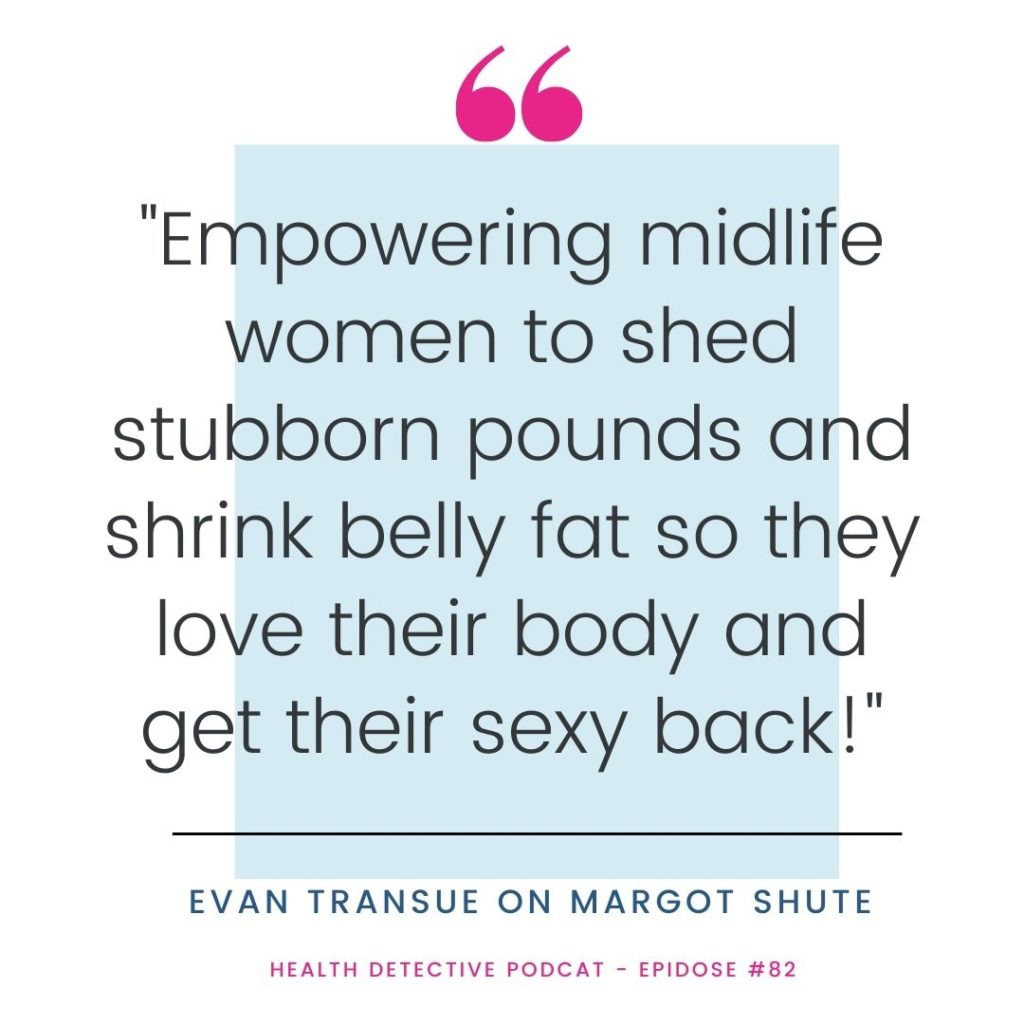
Again, we get into very technical diagnoses and very specific things sometimes. Dr. Sylvia Tara, Laurie Ballou, they’ve come on and really shed light onto why people cannot shed weight. They showed us how this is not as simple as calories in calories out, not in today’s world at least.
Toxins & Hormonal imbalances
There is more to this. There are toxins to be considered. There are hormonal imbalances to be considered. We need to consider dysbiosis. There are many aspects that are shockingly, shockingly, still not being addressed by the mainstream. And we continue to hear people just shouting the same narrative that has not worked for the last several decades, somehow thinking it is now all of a sudden going to work.
I think that wasn’t the Einstein that they always say it’s like the cliche quote, Einstein said, the definition of insanity is doing the same thing over and over and over again and expecting a different result? Well, wow. The people trying to share the weight loss secrets are pretty insane by definition then, not my words, Einstein’s words. However, with that said, Margot does definitely does not fall into that category. Like Lori Ballou and like Dr. Sylvia Tara, she’s coming on and really giving us a brand new perspective on this. And if you’re someone who has felt completely invalidated by this narrative that is still pushed, the “oh, you must just not be doing enough” or “you’re not trying hard enough”.
And you know that you’re trying harder than 90, 95% of people around you. Then this is the episode for you. And in the beginning, we also get into some really deep stuff. Some of Margot’s journey with eating disorders specifically bulimia and it’s worth listening to that part. Even if you’re only coming here for the weight loss side.
I think there are some powerful nuggets in there. Margot just came on and completely shared her heart. And I really have huge respect for anyone who does that because I know firsthand how hard that is to do it. Doesn’t really, I dunno, it doesn’t really get ever easier.
Weight loss secrets are pretty insane by definition
Maybe it gets a little better than the first few times, but then it kinda gets stagnant and no, that’s never a fun thing. So I have huge respect for anyone that’s going to do that in the name of helping other people. I thought that was pretty amazing. So make sure you kind of listened to both parts of this.
We have the bulimia part, and then we move into her signature method for actually getting people to finally be able to shed the stubborn fat that they might have been trying to shed for years without any relief. So without further ado, let’s get to the episode. All right. Hey there, Margaret. Thanks so much for being here with us.
[00:04:20] Margot Shute: Hi Evan. Thanks so much for having me great to be here. I’m glad to be talking to you.
[00:04:24] Evan Transue: This is I always tell people this because there are so many FDNs out there in the world now. There are like thousands. I’ve never met an FDN I didn’t like, and I’ve been fortunate enough to talk, I mean, I’ve interviewed almost a hundred now let alone the amount that I’ve talked to.
And these are some of my favorite podcasts where I have just a little bit of background on you, you know, a little bit about me and we basically get to have that wonderful first FDN meets FDN conversation together for the public though. And they get to hear the different things that we’re going to talk about.
So I’m excited for that today and something that I mentioned to you before we even got started, that I want to bring up to the people listening is that I love when someone comes on here and brings a new twist to the whole weight issue thing, because obviously statistically that’s pretty much, if I’m not mistaken, the number one thing that most of us are dealing with in today’s modern world is this excess weight gain.
But we’re getting to a point in time. Yeah, the traditional calories in calories out thing, you know, there are still people out there preaching that as if it’s a universal truth, but FDNs know a little better. There’s many things that can be going into that. And outside of Lori Ballou and Dr. Sylvia Tara, who both did fantastic jobs, out of 80 episodes or something. We’ve never really gotten a chance to speak about this today.
So I’m super happy that you’re coming on and sharing a new perspective and different information. And I know that you’ve listened to the podcast before, so we’ll get rolling here with the same exact question that we normally get started with. And that’s just as simple as when did your health complications start and what the heck did they look like?
When did your health complications start?
[00:05:57] Margot Shute: thank you so much for that question. So in terms of health complications, I’ve, you know, if you look at me from a traditional sense, you know, I don’t really have a traditional pain-to-purpose story where I had a chronic illness.
I had the usual sort of little ailments and I came from a family. I grew up in South Africa and I was born to a family, and that were traditionally medical. I had a father and uncle who were doctors. My brother ended up going to medical school. My mother was a nurse and I went to nursing college as well.
And so the thought of having natural remedies for anything was frowned upon. Everything was very traditional. My father was basically a walking closet of Pharmaceuticals. Whatever you needed when either there was an ill, there was a pill for that. And whenever there was a little unusual bank, there was some surgery or going on the enough for that.
That’s how I was brought up. And so what actually happened was, you know, in that true sense that while I was growing up and living that way, I actually was a very overweight child. And that started even before I hit my tweens. And I’m actually, my mother took me to a dietician at the age of 11, and put me on a diet where all sugar and all fat were removed from our diet, very restricted.
“I was miserable & diet wasn’t working!“
I was miserable and obviously, it didn’t work. And that was basically the start of my lifelong journey with a rollercoaster dieting. And so I would, if I was always going on some sort of diet just, just went on and on. And unfortunately as well there was quite a bit of body shaming and teasing within family and close family members and friends.
And so I didn’t have a lot of confidence. I just, with that came along a lack of self-esteem. And then, you know, I’d go on a diet, lose the weight, everybody would be excited and celebrate, and then I would go and find food and binge and go into a closet and binge on all the food. And then they couldn’t understand why they gained all this weight.
I would lose the weight and then gain it back.
And so that started also emotional. And that was my journey and it was just ongoing. And when I got into my twenties and I got my first corporate job really started honing in on dieting, just getting so restrictive, but there was nothing, whatever I did, I just would lose the weight. But then I would gain weight back and some, and it was so frustrating.
I even got into heavy exercise. I joined a running club. I started running for the first time doing half marathons. I even joined a cycling club. Every day I was doing exercising, but I was living on so-called diet food, the diet bars, the shakes, the pools, or whatever and nothing worked. I think, and that was just my life story that I wanted to share because so many of us actually have gone through that and I’m a midlife woman and it was not until very long ago that I actually eventually found the missing pieces and overcame these weight, weight, loss blocks that were really stopping me from actually, you know, reaching my, my goal weight. And just making me feel more confident and, and happy and joyful within my life.
How I found Natural Medicine & Health
That was the story. But, you know, along the way I did find after I’d had my son and that was 14 years ago, I actually came across a neighbor that just moved in and she introduced me to natural medicine, natural health. She was, you know, she was a homeschool mom. She did you know, she, she fermented a lot of her own food.
They bought all their foods from Whole Foods. I thought they were a little crazy with some of the stuff, but I started introducing organic food slowly. But I didn’t think that was really going to help my weight. And I was still on this fixation with going fat-free and, and I, you know, raw honey and a Garvin, all that stuff will be okay and I’ll still need to go and exercise heavily.
I had no idea that what I was doing, I was really ruining my body, what was going on inside. And I thought I just had that mentality. I’ve just gotta be able to do. And then I came across just actually coincidence through my neighbor. She was sending me blogs and names of influencers in the health space.
Metabolic Typing
And I came across a blog and it was somebody who actually got into natural, Traditional dietitian and she started this weight loss program, and incidentally, it was all around the metabolic typing. And I found it very interesting and I did my quiz and I came out as being a protein. And I’m sure we’ll go into this later on in the interview.
And I tried that, but it was a little different because it was five meals a day and I was eating many meals and I was getting hungry and I was having cravings. But I think the philosophy was great. And it kind of planted that seed. Is that what she said was you got to have fats in your diet. You actually, need to remove grains and things, all of those Inflammatory foods.
You can eat the mini-meals. And so that is something that I now I realize today that these mini-meals do not work. But she spoke about the toxins and why organic is so important and going non-GMO. So I really started learning and honing in on my awareness of the natural field and how our food is laden with pesticides and toxic ingredients. And that can contribute not just to our health, but also to our weight.
So I really dialed in and really got onto her program. And then, you know, I had some, I had some success, but it wasn’t, I was never able to reach that finale, that goal that I’ve just had in the back of my mind, this is where I want to be.
Holistic Health
And then I went back to school. I actually decided to go into holistic. Holistic health course through the Trinity school of natural health. And I loved that because I got more exposure to natural and holistic health. It was wonderful. But they have one of the major focuses on is on energy healing.
And I had a great introduction, even though it was. It was very basic 101. But realized that it wasn’t so much about the weight. It was more about what was behind the weight and all those stuck traumas that were actually sitting in my body, knowing all those years that I was actually being body shamed and teased and had to deal with it constantly.
And always thinking that I’m just this person that has no willpower, tends to overeat, will binge, and go hide and eat. And it was all my fault. And I just always brought that upon myself and I never had anybody really close to that I could go talk to about my, you know, about my feelings. And then when I got introduced to this energy side of this course that I was doing, it was such an eye-opener.
And I knew I wanted to go back to that. But I felt that when I was close to graduation I, it was great. I learned such a great deal from the course, but I kind of felt, I want to do this, I want to help people. I want to help people get healthy, but not necessarily lose weight. That was just my issue. You know, I was still not quite connecting the dots right then, right yet.
The connection between weight struggles & health
That, that there is a connection between our weight and our weight struggles and, and health. And I knew I want to to help people, but I just didn’t, I was kind of stuck with where I was going and, I was talking to one of the instructors who was helping us with our graduation. And I said I don’t know what I’m going to do.
She said, why didn’t you just do this little basic health coaching? And then you can go and do some health coaching. You can maybe work for a holistic doctor naturopath as a health coach, and you’ve got these skills and this qualification behind you. And I thought that’s great. I think that would be a great thing to do.
I’ll go and sign up for that course. But then a few weeks later, I listened to an amazing summit. And one of the summit speakers was Reed Davis, who was the founder of Functional Diagnostic Nutrition. And as they say, Evan, the rest is history. I was absolutely blown away by the interview and I literally signed up, I had to graduate in a couple of things I wanted to do, and I had to cancel my registration for that health coaching course.
It was going to come after graduation because I thought, no, no, no. I want to do this FDN. And that’s what I did. So it was about a month later, the I signed on for the FDN course and it’s been an absolute eye-opener. I just it’s taken my health and my weight to a whole new level and my whole perspective on weight, And what I’ve been taught all these decades.
I mean, I’m over 50 now, so it’s, and it’s been a lifelong journey, so I’ve, you know, I’ve walked to tell the tale, so it’s, it really has brought so much to the lab for me. So, and here I am today, I’m on the journey. It’s always a journey. You know, it’s never a destination. We’re always on this journey. And I like to teach women and mid-life clients as well. And so here I am today. So that was the FDN way. What Iearned as well, and it’s just a quote, and I actually have stole it from one of my business mentors and FDN that we all know Jenn Malecha.
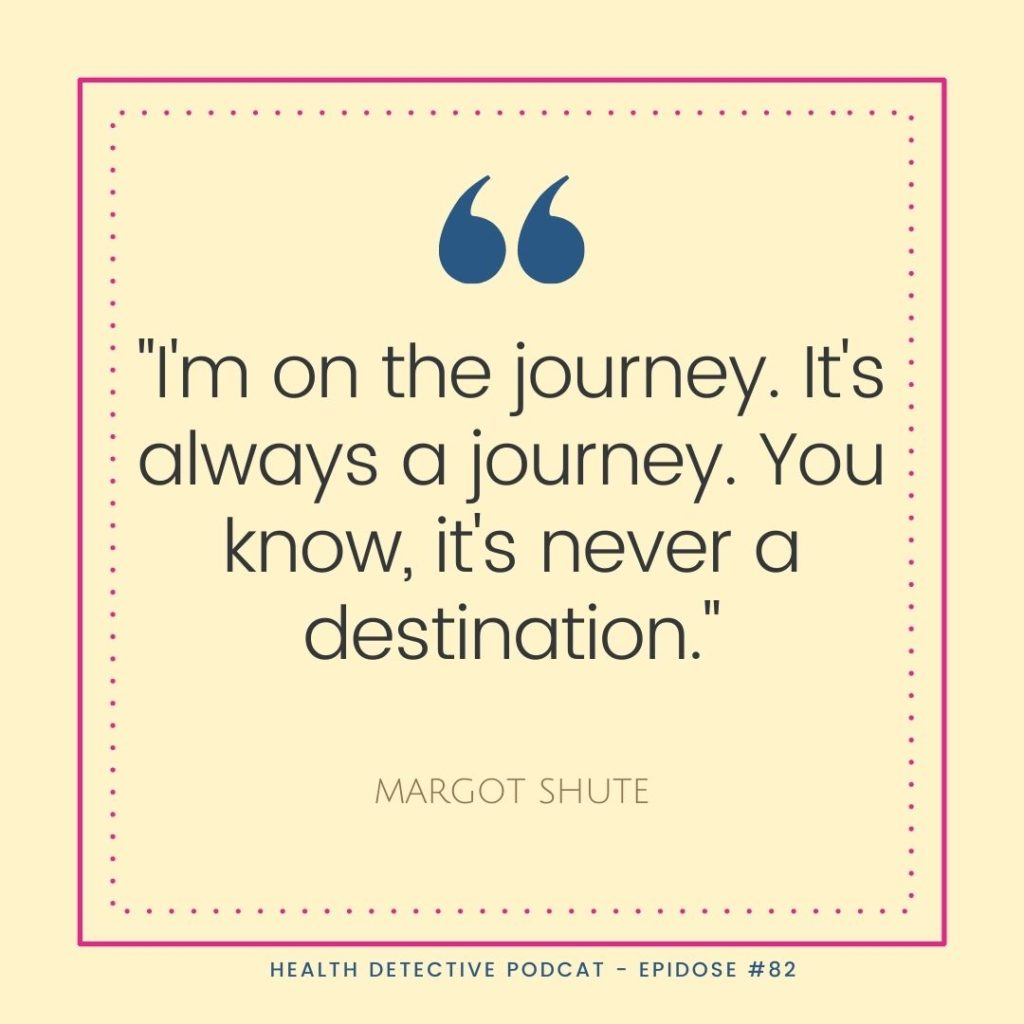
So Jenn you, you actually get healthy to lose weight and not lose weight to get healthy. And I, I love that mantra and I’ve always mentioned that, you know, in a lot of on my weight units on my website and an a lot of my posts. And I remind people that that’s what it’s all about.
[00:15:22] Evan Transue: I think that’s really well said, and I love that. That’s a powerhouse team right there. Right? You got Reed Davis showing you the course. And then Jen Malacca, she’s the one who got me involved in FDN about four and a half years ago. I saw her speaking and it doesn’t take very long after hearing those two speak before you’re like, “where do I sign up for this thing, right”?
I’m like, “All right, I’m good to go”. There’s so much to unpack there. I appreciate you diving in and bringing us all this information. I want to rewind just a little bit because this is something important to me. And I know that this is something that is so hidden very often. You’d kind of mentioned this bingeing thing. And again, I know I’m going back a little bit, but it is important to note, was this happening like as a teenager and stuff, you mean even in that like 11, 12, 13-year-old range that was already going on?
Binge Eating
[00:16:07] Margot Shute: I actually started as a teenager. In fact, I went to boarding school and I, and it was, you know that being in boarding school, obviously the food is not very desirable. And there was some, quite a few Students that had eating disorders, and I kind of went the other way.
I actually had some bulimia. So that side of the eating disorders are, most of them were actually more on the anorexia side. But unfortunately, I was one of the, one of the ones that had the bulimia and that’s where it started. It actually started probably in my, in the high school I would think I was a freshman maybe a sophomore.
And that’s when that started. But it was a constant. You know, when I went to school and, you know, I didn’t have many friends and I didn’t have, I didn’t have a lot of weight to lose. I was probably about maybe 15, 20 pounds. I mean, maybe as a youngster, it seems a lot, but I look back now and I hear, you know, Well, mid-life women that I speak to, that it will be on similar journeys, you know, they’ve struggled with having, you know, with, with a 50 pound 50, sometimes up to a hundred pounds of weight.
Sure. They’ve had to deal with all their lives. And so, yeah, that’s when it actually started that binge eating.
[00:17:31] Evan Transue: Yeah. It’s, it’s something close to me. Not because I dealt with it myself, but.
I don’t keep it vague. It was not a family member. Just so there was no, but I’ll keep it vague just because why share someone else’s story? I just had someone very close to me when I was a teenager and it was, you know, a close female in my life. And I did not know for a year that they were dealing with actually exactly what you just said.
Bulemia and this stuff is real guys. I mean, it, it really affects people. It is absolutely a disease and. It’s just, it’s amazing when I can hear someone kind of overcome that stuff. I don’t know what it’s like to go through that I’ve been through stuff, but that it’s gotta be pretty distressing in my head to have a major issue around something like food that is so fundamental to our lives.
That’s what I really try to emphasize for people. It’s like our whole lives as human beings is revolved around food. Like when are we eating breakfast? When are we eating lunch? We take breaks for corporate work simply so people can go eat lunch. You know, the family dinner thing is, I mean, kind of history now, unfortunately, but that’s a major thing, right?
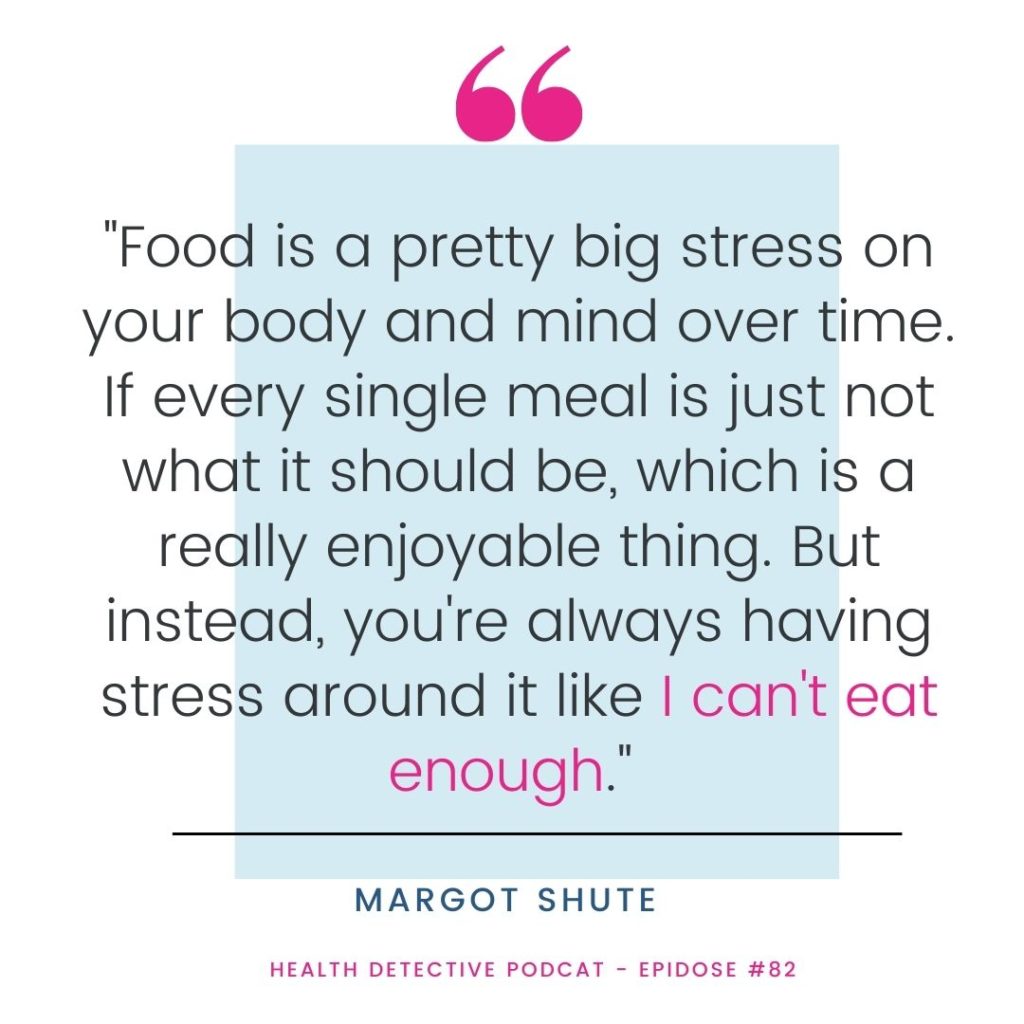
This is gotta be a pretty big stress on your body and mind over time. If every single meal is just not what it should be, which is a really enjoyable thing, ideally. Right? But instead, if you’re always having stress around it, like I can’t eat enough or, you know, I, if I’m not mistaken and correct me if I’m wrong, but it’s, it’s actually been years, thankfully, since I’ve had to bring it up.
Bulemia is bingeing followed by purging, correct? That’s how that one goes?
[00:18:46] Margot Shute: That’s right. They are stretches of, of not eating. You would be restricting calories, exercising intensely maybe for a few days, couple of weeks. I would sometimes go on a full week and I would lose and then boom, I would just all come back, you know, that’s like, I just can’t wait to go to the closest store and just, you know, that’s what I used to do.
And I’m just sharing, sharing my vulnerability. I would go and I would sit, you know, sit somewhere in my, in my little small boarding school, tuck cubicle. And we had, we did it. Wasn’t dormitory-style. We had these cubicles, so there was a little bit of privacy and these little miniature closets, and then I’d find, find my solace in the food and I would go for it.
And yeah. And boarding school, trying to go and purge it up. It was quite a challenge, but you know, you just find your way to do that without being noticed. And you know, you could, but the thing is you can’t hide it for so long in a boarding school. And, you know, my, my secret was discovered you know, and I wasn’t the only one anyway.
And so, you know, I had to go speak to the school nurse and, and try to deal with my issues. Not in a very sort of, you know, sympathetic way. And that was boarding school for ya in South Africa. Yeah,
Vulnerability is actually one of my biggest assets
[00:20:05] Evan Transue: I appreciate it. And you kind of beat me to it with the word vulnerability. I just, I thank you very much for that, because this is when this podcast is most useful for people.
I lived in a world and it was my own world when I was younger that I refused to share anything negative that was going on or happening in my life because of shame. And this was honestly, really in many ways, self-imposed I gotta be honest. I don’t really, I can’t recall any outside forces directly, maybe just society as a whole fair enough, that were influencing me in such a way that I can’t share stuff. And I always say that vulnerability was once my greatest weakness and now it’s lack of vulnerability that is, and now vulnerability is actually one of my biggest assets because when we’re just open and honest like that, we sometimes think that the world is going to meet us with criticism and what I actually fine, especially in today’s climate is that this is when we get the best response. And this is when people get the most healing when someone comes on and just has the courage to just be like, Hey, this is what it is. This is what it looked like. And I know that we have a predominantly female audience. We have plenty of men, but it is predominantly female.
And I’m sure that there’s plenty, probably dealing with this still cause these disorders are overrepresented in women and if nothing else definitely with the age bracket that we serve, I know that there’s probably many people with daughters or sons that are maybe struggling with this stuff and they’re starting to notice the pattern.
So. I know this might be a tough question. I don’t mean to put you on the spot. So obviously feel free to take as much time as you’d like from a parent’s perspective, knowing what you know now, is there any advice that you could think of to maybe give a parent if they suspect or know that a teenager is dealing with bulimia or some type of other eating disorder?
Like how can they support their child with that? What might’ve been useful?
Advice for teenagers with eating disorders
[00:21:56] Margot Shute: That is such a great question because, you know, we don’t want to, you know, bring upon the history that we’ve gone through on our, on our children, on the generations that follow us. So that is such a great question. Absolutely. You know, it’s, you know, you look at it, it’s just when these sort of patterns that become it.
It’s the first thing I would notice is the behavior of the child. Sometimes when the, the behavior is successive the child probably would be not, not paying much attention to probably the personal appearance. Because that was me just kind of wearing baggy clothes. Cause I just felt so bloated and so overweight trying to avoid, you know, social gatherings, getting together with friends You know, and obviously as a teenager, for me, it was, I was, it was restrictive in the boarding school.
So I couldn’t get in, get into my car and go and go to the store and go and shop and do something crazy. But you know, I think that my teen now, you know, she’s going to be going, she’s a senior non she’s going to high school. We know she’s if that was to be, that was her, it would be something to consider, you know, and how our relationships with their friends.
Warning signs to watch for with Teens
Is she just, you know, spending more time at home? I think that’s the first thing is that disconnect and that disengagement from friends and the mood and the, the moodiness and maybe a bit of confrontation. And with the linear, you could definitely look at, you know, the, the breath is one thing. And I didn’t do it for that long.
I mean, there are people that have gone. They’d been bulimics for decades and decades when I hear of Jane Fonda, you know? And so, you know, from a, from a physical point of view, like, how’s the dentition, you know, the quality of their mouth and their teeth and their breath? You could actually start noticing hair falling out.
I mean, even with anorexics as well. So from that physical point of view, but they would be more of a long-term thing, man. I would say. I went on and off for maybe a 10 year span, but I mean, there would be like a year and then I was offered two years and I went back a little bit. I know it’s crazy. It sounds crazy, but that was me.
But I think that those would be the top three things. Just looking for disconnection from, from friends moodiness you know, confrontation and just, you know, slovenliness and not paying much attention to personal appearance. And things like, you know, the hair falling out and the teeth and breath.
[00:24:20] Evan Transue: That’s like, I mean, it’s, you know, it’s a tough topic, but that is great advice. And thank you for giving that through our answer, because I do think there are many parents out there that, I mean, listen, if you’re a parent dealing with this, I’m not saying that this is exclusive to teenagers.
“You do not need to feel ashamed about this. You need to get help if that’s what you need to do.”
That’s not the case. It’s just overrepresented there. You know, if you’re a parent dealing with this, my message to you is just simple as that. You do not need to feel ashamed about this. You need to get help if that’s what you need to do. Right. That’s straightforward for me because I’m not judging you, Margo’s not judging you.
Like we got to get this stuff taken care of, but our teens might not realize that. And I don’t know if you know this Margot, but some of the listeners might I, my work outside of FDN is I do a lot of work in schools. I do speaking there specifically for my mental health story and I never, I never really dealt with the eating disorder stuff, but yeah, that’s a main one.
You know, kids come up afterwards and they’re dealing with some really serious stuff. So anytime that we can help with that, I appreciate it. And if nothing else, I just appreciate that answer. So the next time I’m talking to a parent or something and they come up to me and say that that’s, that’s great advice.
Breaking the Cycle
[00:25:20] Margot Shute: I just want to just say we don’t want to get to, we don’t want to get to that point. And so for me, with my philosophy and knowing, you know, the way I was brought up is that there is no body shaming in my household. And no matter where you are, how you look, whether you on the one side, the one end of the spectrum or the other, we do not do that.
We don’t, I don’t, you know, I try to discourage my kids to speak ill of anybody, you know, not to, to criticize and just to be thoughtful about words. And I’ve tried to instill this in them from, since they were little. And with an, especially when they were both going through their puberty and where they were becoming more aware of the body changes and their body image, I knew I had to stop that conversation.
And so I don’t make a thing of it where they know how I eat and I don’t restrict anything. But we do things in moderation, but, you know, we don’t have to go totally gung ho, but as long as they eating a certain amount of veggies a day, you know, getting their food. Getting the servings and our holistic, FDN approach to eating.
And they can have the occasional snack and their treat but I’m just, I just don’t have that. And unfortunately, there was just the bad messaging that I got as much as I love my family to death and I miss them dearly being so far away from them. I just don’t want that, that that history to repeat itself with my kids.
And that’s why instill it so strongly. And I just don’t want my kids to get to that point where they feel that they are deprived in some way. And I’m always on their case. Yeah. Gaining weight or whatever.
How Mental Health is Affected
[00:26:51] Evan Transue: That’s amazing. I mean, and that’s breaking the cycle, right. And I think this can be applied to so many things, whether it’s generational trauma, mental health stuff, physical health stuff.
We’re, we’re in a weird time in history because you know, sometimes people are surprised, especially when they’re not in like our community about how optimistic I am about many of the things in the world. And I’m like, well, you know what? I think we’ve been trending on this downward slope for a while, but I think we’ve kind of hit the valley.
And now what we’re going to see. I mean, let’s just talk about the mental health stuff. Cause I can relate to that, conceptually. Clearly, this falls under the category of mental health. We have a whole brand new generation that is willing to talk about this stuff that is going to be able to have these conversations with their kids.
I go into schools and these teachers and counselors are so aware of this. They care so much. People I’m always like, you know, what’s like the funniest thing, like a kid’s done in a presentation. I’m like, you know what? I don’t really have kids mess around that much. I don’t think that’s because I’m such a good speaker.
I think that’s because every single person in there in today’s world kind of gets it. This is just an important topic. And you know what? We don’t, we don’t really mess with that speaker. We just leave him alone. Cause this one matters and we don’t want to see bad things happen to our classmates. Again, you know, we’re at the bottom of that valley, but I think we’re coming back up and I think that’s amazing that you’re doing that with you know, your children.
That’s like, Hey, let’s break this cycle. This is how we’re going to do things in our household. And then recognizing that yeah, you know, our parents might’ve had just genuine ignorance around it. There there’s nothing wrong with that. Ignorance is not if people use that as such like a derogatory term, it’s like guys, ignorance means you don’t know something.
You don’t have knowledge about something and genuine ignorance can be pretty hurtful and dangerous, even if it has no mal-intent behind it. Right?
[00:28:32] Margot Shute: Exactly. No, absolutely. There was none of that I always say was done in love. And they didn’t know it better, but it’s yeah, absolutely.
[00:28:41] Evan Transue: Okay, well, cool. I’m really glad that this is why I love doing this this way.
Cause I never know which route it’s going to take. And I’m glad we spent some time on that, but I’d love to shift a little bit more into this midlife stuff and really helping people with this stubborn weight stuff, because this is kind of the opposite and right. You know, eating disorders, a whole separate thing, but what really happens when someone does have a genuine weight issue and what can we do about that?
So once you finally found FDN, you know, you had kind of already mentioned vaguely these things that you finally figured out, you got like the final pieces to the puzzle. I know you’re still working on stuff. We all are, totally cool. But there were some aha moments. It sounds like for you. What were some of the things that you learned maybe going through FDN about the stubborn weight and just maybe things that people might not have ever heard of or considered before in their weight loss journey?
Stubborn Weight & What You May Have Not Considered Before
[00:29:28] Margot Shute: Delving into the reasons behind the, which come in the form of, of doing lab testing. And that was, they were all the lab testing or the results that I had received after having done my lab tests were just aha moments. When I realized I had imbalanced hormones, my cortisol level, when I’d done my first one, when we still had the BioHealth testing company and we still were affiliated with them.
And my cortisol was actually through the roof. I was in the acute stage. But over time I’d actually done two touch tests and it’s now come down and I’m kind of in the exhaustive phase. So I think with that as well, the correlation between our cortisol and how we’ve held onto fat because our body basically sends a message.
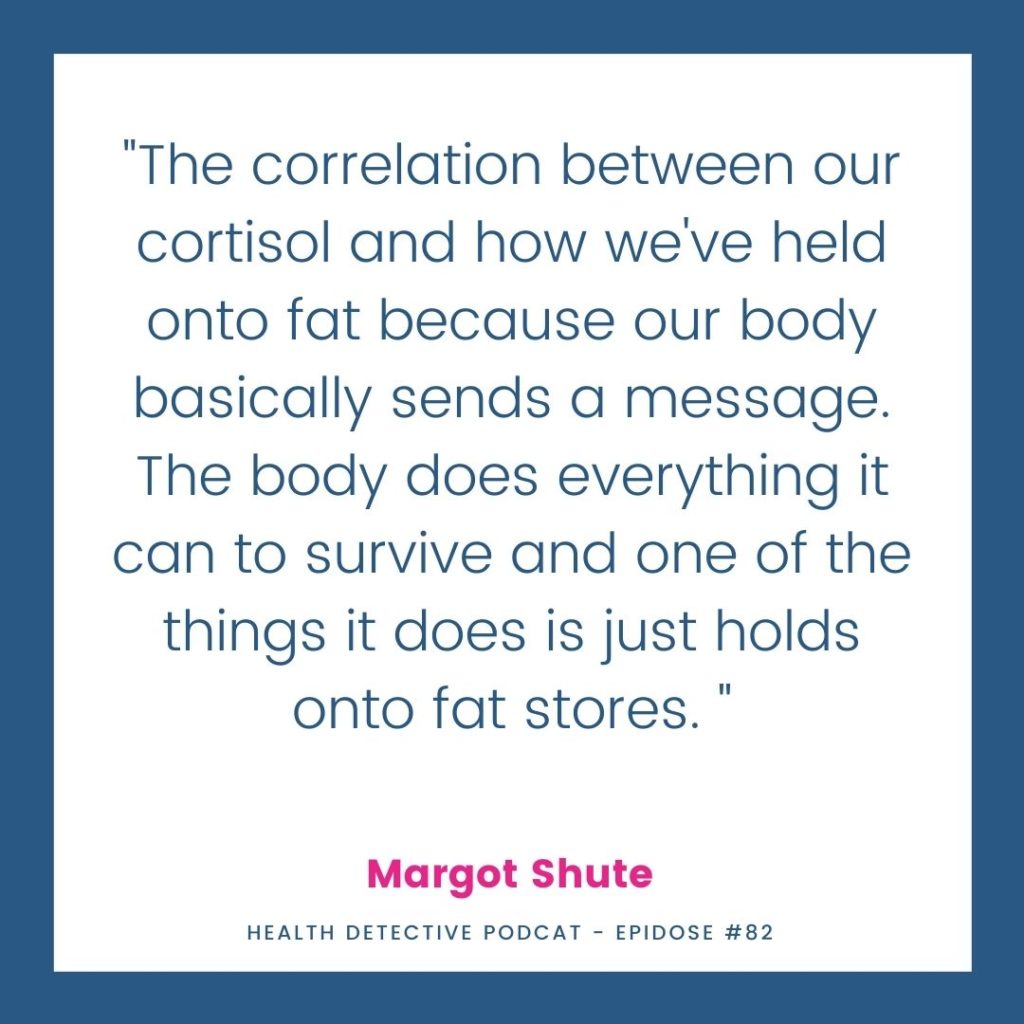
It sends a signal to say when the cortisol is so high it’s in survival mode, it’s kind of puts us instinctively and into that fight or flight mode. And where we are sending signals to the brain that we need, you know, we need these hormones and these messages that we can’t digest our food and it’s kind of danger time.
And so we got to do everything we can to survive. One of the things it does is just holds onto fat stores. And I believe that my cortisol being where it was, and it was kind of, there was not much that mod could do. It was probably on its way down. Just being a person that I am, you know, Most of the time, very stressed and not very sure of myself kind of always sort of on edge, a little bit of anxiety.
That was always part of how I grew up as well. And I think the stress of moving to the, to the country immigrating, leaving the family behind it was a very, very hard move. I think I struggle. For the first, I would say first eight years, and then it got a little better. But yeah, it was a struggle and I think that’s also contributed to, you know, harm my cortisol pattern and my HPA dysfunction.
Everything out of balance
My HPA was dysfunctional, to say the least. And then obviously with my whole, my sex hormones as well, I noticed that they were very on the, on the, all of, both of them, the estrogen and progesterone were on the low side, as well as the testosterone and with that as well, that comes along with midlife. But you know, sometimes, you know, it, depending on the person it’ll start at different points of one’s life.
So everything was really out of balance. And this obviously was a major missing piece towards my, my weight. And then when I looked at my the gut test, that was another eye-opener I’d actually had H pylori. We had a bacterial infection, H pylori. I had a major dysbiosis, which is for those that don’t know what disposes of iIt’s, basically an overgrowth of bacteria in the gut, and we are largely microbiome more than anything else.
And. And then I also had nose day. We did the liver. What do you mean what it was called now? You even remind me of the names, the BH one-oh-one. Is that what you’re referring to? The liver lipid peroxides, or is the those are the, those are the ones.”I was obviously not detoxing very well”
And also my liver. Was really not where it should be my liver health. I was obviously not detoxing very well, and I was always holding on to toxins. And then I did an ancient HTMA and I came across some heavy metals. So with all of these things going on in the body and that it obviously accumulated over the, over the years and they don’t just show up and then suddenly it’s like, okay, That’s there now you got to do something.
This has been accumulating since, you know, since, since in utero. Not just when you are born. And so that was all an eye-opener and I met, I cleared up my, my gut. But unfortunately last year, I think during COVID I think stress levels hit, you know, hit rock bottom for me again. And I read it, I went and did the Dutch test and my levels were pretty low on my cortisol, and sex hormones were even lower.
And then my gut health had not improved much in fact It actually deteriorated. I ended up with I H pylori was still hanging around and I also ended up with a parasite infection and even more profound dysbiosis. And so I am right now, I’ve just finished a gut path protocol and I’m not working towards doing a heavy metal detox, but I’m not quite sure where I’m going with that just yet. But it’s interesting because we have these results before we know we know about D.R.E.S.S., diet, rest, exercise, stress reduction, and then the supplementation based on our results and you know, what would work for us. There’s always something there.
Now we can connect the dots
But what I do realize now is that. These are all little dots that we can finally connect, and we can finally feel confident enough to continue this path, but it doesn’t mean to say that we stop. We just keep digging. We keep going further. And this is what I love about the philosophy of FDN is that we can keep going further and we have so much access to other alternative platforms and programs, even, even biohacking.
We, you know, I know there’s a lot of connection now with the biohacking and this is something that I’ve, that is really now dear near and dear to my heart. And I’m really, getting really honed in on. And so we always find something. And this is, and I love working with midlife women because they’ve also got to a stage where they’re ready to make a change because they are now starting to focus on themselves. And that was for me as well. I was very much a people pleaser. I think just the way, you know, with this lack of self esteem, just pleasing everybody and trying to be thin when I was growing up so that people could like me. And so that was the way I was when I grew up in so many people are like it, I’m not the only.
“I was always putting myself last and doing, putting everybody else’s needs ahead.”
But I was always putting myself last and doing, putting everybody else’s needs ahead. And, you know, just with raising a family and being a stay-at-home mom for the first few years of actually moving to the States. And then I think by the time I hit my forties and learning about the mid-life and I thought, no, this is Donard.
I, you know, I need time for myself. Hello. I’m also important person, right? Yeah. And so I, I try to encourage that with my midlife ladies as well, that you’ve got to start taking care of yourself. It is a challenging time of our lives because even though, you know, empty nesting is is taking place. We’re not done yet with taking care of others.
We often consider the, the sandwich generation where we are sort of saying goodbye, gradually passing on that independence baton to our children. But now we are taking on more responsibilities with our own parents. And so we have those extra challenges, but I just feel like the only way really to make progress.
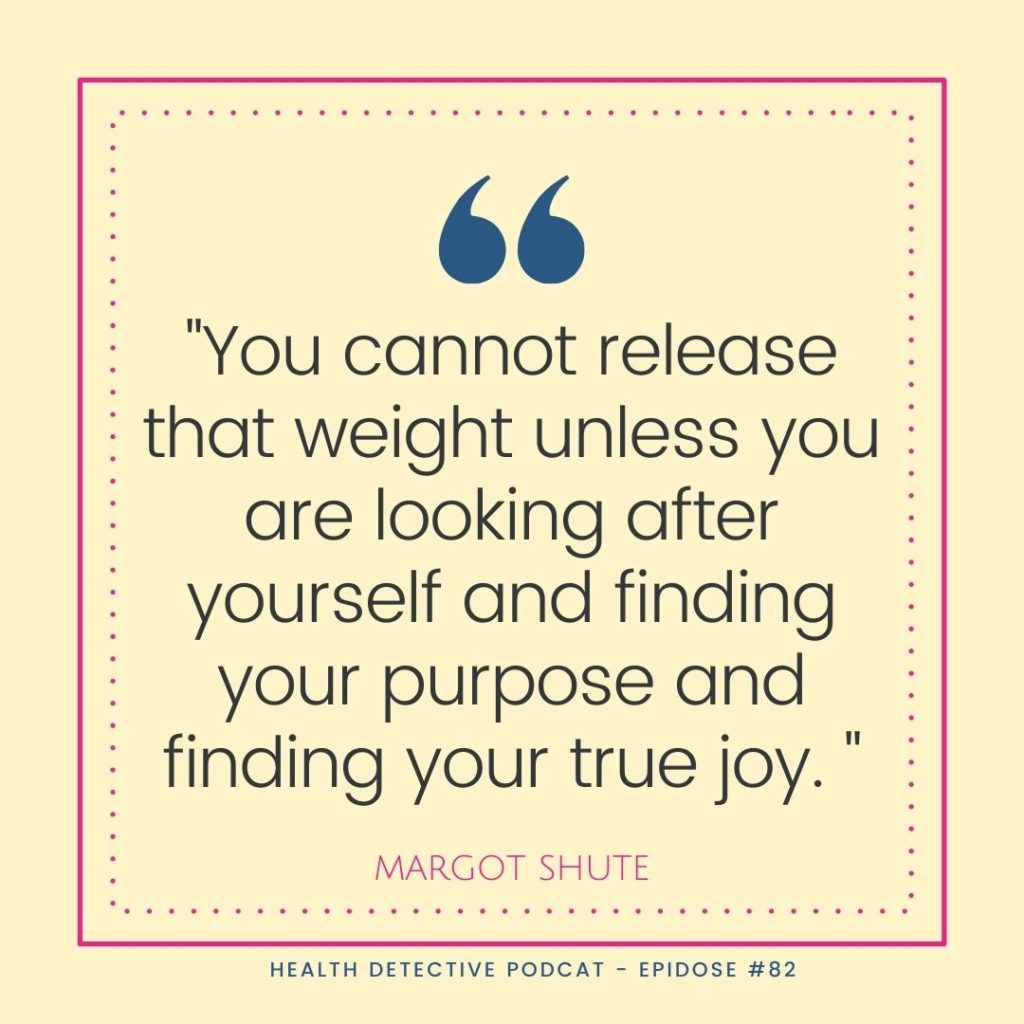
Yes, you can do the biohacking. You can do the tech labs. You can do D.R.E.S.S., but you’ve got to take care of yourself. Self-care is critical. You cannot heal. You cannot release that weight unless you are looking after yourself and finding your purpose and finding your true joy. What really lights you up every single day, the moment you wake your wake up in the morning and open your eyes. That to me, Is the most powerful healing modality that we can do for ourselves.
[00:37:04] Evan Transue: That last part there really got me with chills a little bit, because it’s so rare that I, I always hear, like, who’s going to deny that a passion or loving what you do, wouldn’t be beneficial towards your health, but it’s very rare that someone says.
Excuse me, that this is one of the most, if not the most beneficial thing that we could do for our health. And I am in perfect agreement with this because I know from firsthand experience. This is how I looked at it at 18. I don’t know why I had this perception already. I thank God I did. I was like, wait a second.
So I’m going to go work 40 hours a week. And let’s be honest, who works 40 hours a week in today’s world. So let’s call it like 50 or 60. I’m going to go work 50 hours a week for the next 40, 50, or 60 years of my life. And I’m going to hate every second of it. Yeah, guys, believe it or not, that could affect your health over time.
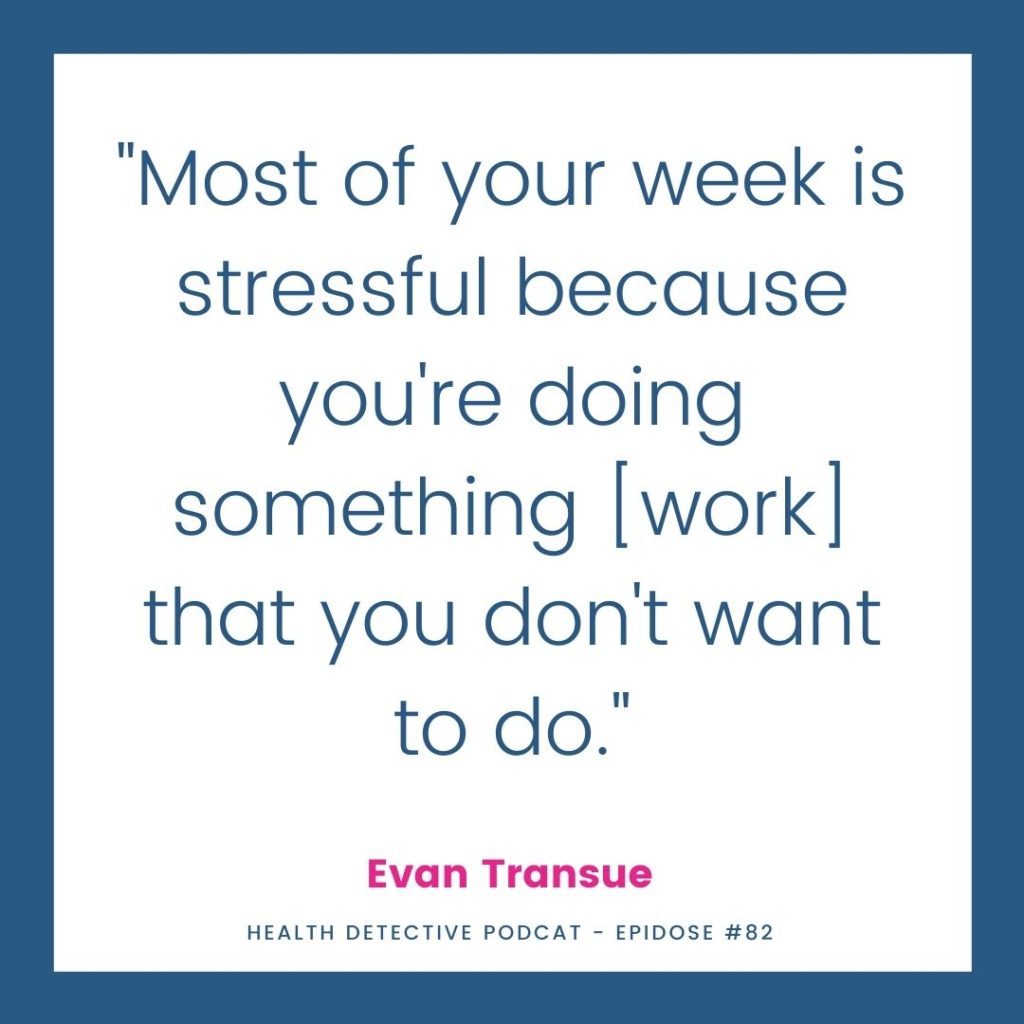
You know, like if most of your week is stressful because you’re doing something that you don’t want to do. I wouldn’t recommend that. And of course what’s the obvious thing that people always argue with that Margot. Oh, well, that’s easier said than done. I tell people this, I don’t give a damn if you have a ten-year plan to get out of it, have a plan because the 10 years is going to pass anyway.
You know, if you don’t have the plan, you’re going to be stuck, right where you were before then. So move towards the things you actually like.
[00:38:25] Margot Shute: Absolutely. You’ve got to, and you know, you’re there’s still time, there’s still time ahead, you know, it’s not black, it’s doom and gloom. Once we hit our fifties, it’s all downhill from there.
Not a chance. I mean, people are thriving, you know, they’re starting careers. You know that for me, it was a career change for me. You know, there’d been made major life-changing, you know, turning events for people at the stage of their life. And they really don’t have to be dealing with all that baggage that they’ve had to put up with all those years.
They’ve got to find their passion and their purpose and where we’ve so many of us have been, you know? And you’re so right about that.
[00:39:02] Evan Transue: This is why Reed Davis is the number one face for his company because this guy, most people don’t realize is in his late sixties, he looks 50 and I was watching a video of him on Facebook the other day.
Oh, what the heck is that called? Maybe it’s jet-skiing. Wave surfing. I’m like, are you kidding me? Like, you know, there are some people guys and I don’t mean to be pessimistic. I’m just, we got to call this stuff out for what it is. There are some people in their late sixties then. Basically throwing in the towel and statistically, they’ll only be around for several more years.
I don’t think we’re losing Reed anytime soon, if he’s doing that, you know, I can’t do that. So it’s just amazing to see that the system obviously works because you gotta have someone leading the charge that really walks the walk. And I think it’s about a good example of this. As you can get.
A couple of other things that you had mentioned that I just think are so important. You talked about the HPA axis dysfunction. You talked about like the sex hormones, even being out of whack and then also, you know, dysbiosis, that’s not really something you hear in the traditional diet books. Right?
And people still it’s unbelievable to me, especially my generation. I think that they’re just being a little more aware of this, but not, I got coaches online that are saying. Listen, weight loss is simple. Stop over-complicating it it’s just calories in, out like basically, they’ll say eat less calories than you use every single day.
Do you know what I mean? And then you’ll burn fat and I’m like, if we go to the opposite ends of the extreme, of course, there’s truth to this. If I feed someone an adult 200 calories versus 20,000 calories. Yes, of course, you’re going to get extreme results. And you’re also going to get a very unhealthy person over time in completely different ways, depending on which route you take there.
But what about the person that is eating the same amount as someone else and still gaining weight? I just saw, well, I’ll be careful about where I saw it. I saw something the other day where someone posted about a 400-pound individual, mid-four hundred, and they’re eating 3000 calories a day. I eat about 3000 calories a day. I’m 170 pounds and six feet tall. So explain that one. How can it just be calories in calories out? And that’s the difference between 300 pounds? That’s ignorance. It’s genuine ignorance. And so when you are working with these kinds of midlife women, I mean, is that, are you seeing very similar things with them that you saw in your own labs?
You’re like, what would you say the number one thing that you’re seeing with them is that’s like kind of causing this resistant weight?
Mindset & Lab Work Together
[00:41:32] Margot Shute: Yeah. So I haven’t actually worked with women where I’ve have actually looked at labs. We’ve actually run labs, but I have worked with them in other settings and they still come with a mindset.
It’s been just, you know, it’s been at the forefront for decades and they still under-eating low fat or going fat-free. And it’s all about the calorie restriction and all of our excessive dieting. And. And when they enter midlife, because they go to their doctor and they may go to their doctor for a checkup, or they go to their OB-GYN for a checkup and they ask for some advice or they’ll be put on the scale of, this happened to me actually personally, put on the scale, look and say, oh, I’ve gained 10 pounds.
Or, and then it’s, well obviously now that I’m in midlife and it’s all hormonal and you know, I’m losing my sex woman. So this is the reason why I’m gaining the weight. So what I need to do is I just need to eat less and exercise more. And it’s basically what they believe is echoed by their doctors because they don’t know any better.
And they will. That, that is what I hear along those lines as well. That’s what you need to do. And you just have to, either, I heard somebody talk about a doctor said, just suck it up and just live with it. Just make sure that you watch your portions cut and just really get out there and do some AB exercise, you know, go to the gym, sign up at gym.
I mean, some gyms aren’t even open. Or they’ve got restrictions. And just that, that advice is just, unfortunately, it’s just nebulous advice, that is so, that has just, hasn’t done much justice to women, or anybody for decades, you know, when it started with that fat-free generation. And so many of us think that way. And I tried to explain, it’s not about that.
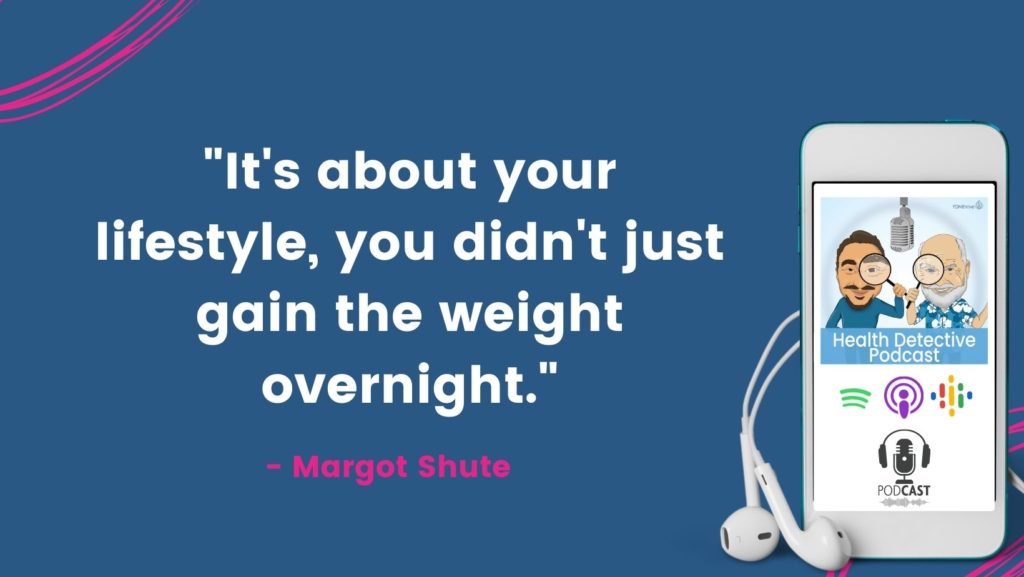
It’s about your lifestyle and you didn’t just gain the weight overnight. It’s not the hormones. It’s that accumulation of lifestyle factors, stress the toxins, exposure to the SAD standard American diet, lack, poor sleep, not drinking, purified water just living that fast, pay 6, 50, 60 hour work week.
All these things are contributing to our weight because it basically all revolves around stress and cortisol because that’s a body is holding onto that to protect us. And no matter what the stressor is, whether it’s a physical, emotional, mental, biochemical, electrical, it’s a stress on the body. When the body recognizes any type of stressor, it will do anything to hold, to protect you, to keep you in survival.
And so what we have to do is we have to address those stresses and those also, including the hormone imbalances. And we look at those before we go full out into dieting, obviously. You know, we look at metabolic typing and what are most often find and for myself as well. When I did my metabolic typing, I’m more of a protein and midlife women tend to, I know, kind of goes against the grain and what we all think about metabolic typing and most women that I found tend to do better on a low carb when they get to their 50’s.
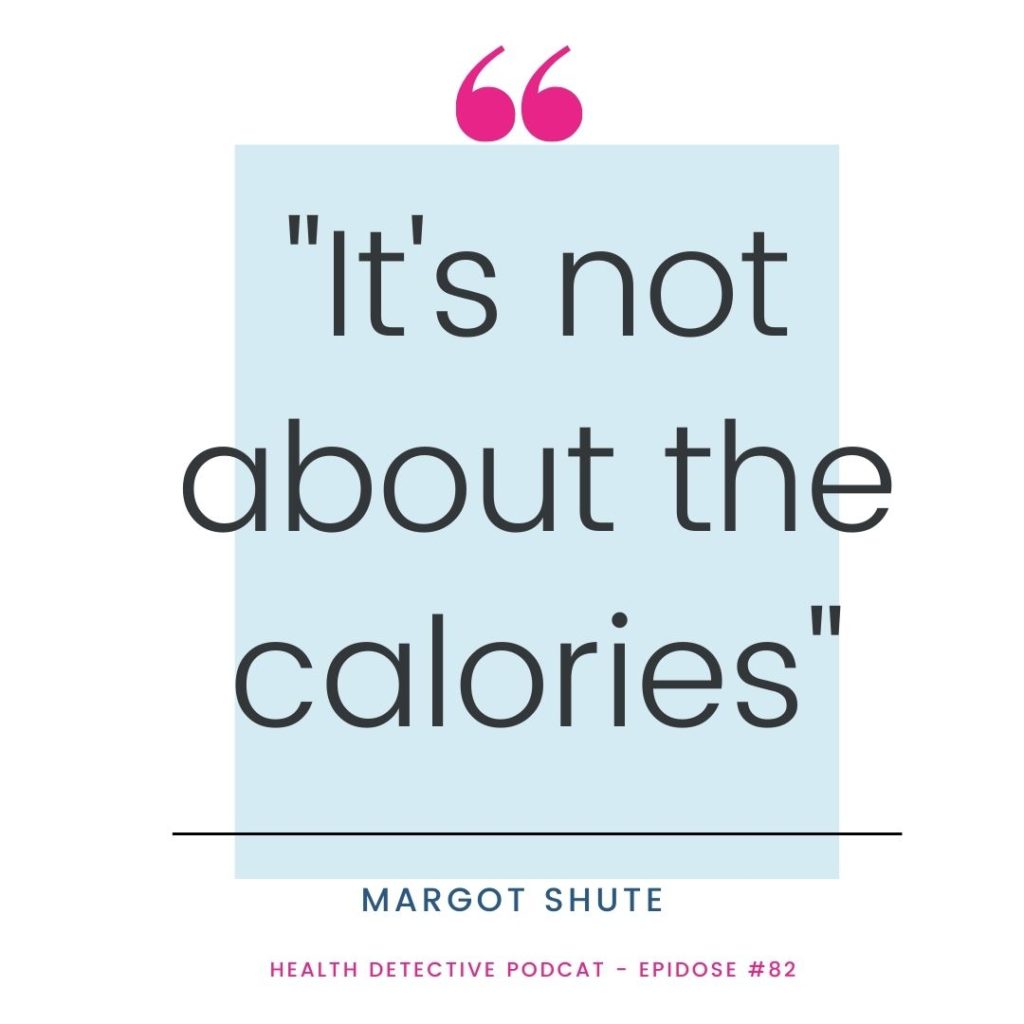
And we just become a little bit more insulin resistant, so we are more sensitive to carbs. And so we have to look at that. It’s not about the calories. And also when you’re comparing how many calories you eating too. Man, that’s 6 4, 2, 1 70 pounds, man. It’s how you absorbing them. It’s the quality and the lining of your gut and while you’re absorbing the nutrients and a calorie of a bag of chips, a hundred hundred calorie bag of chips is not the same as a hundred, a hundred calories of a bowl of almond of raw organic non-GMO almonds.
It’s the quality of the food, it’s nutrient-dense and has all these nutrients. And so what your body does with it. That’s what’s important. How it metabolizes it. You’re not going to metabolize. If you eat a bit, a bowl of nuts and eat a bag of chips, what’s going to happen off of the bag of chips. You’re going to want more chips.
So you’re going to end up having more calories. So its calories are not the same. They’re not created equal. And it’s all, it’s the quality and it’s the functioning of your gut as well and how you’re absorbing the nutrients and with exercise. If I, if I could just talk a little bit about exercise now in Midlife is we have to have a very different approach.
Because of the exercise, we will notice even when we get into our forties, even in our fifties, because most people in their fifties are getting into menopause where we literally have no sex hormones. And we’re not producing anything. And, but they’re not just about the hormones. There are so many other things that hormones do.
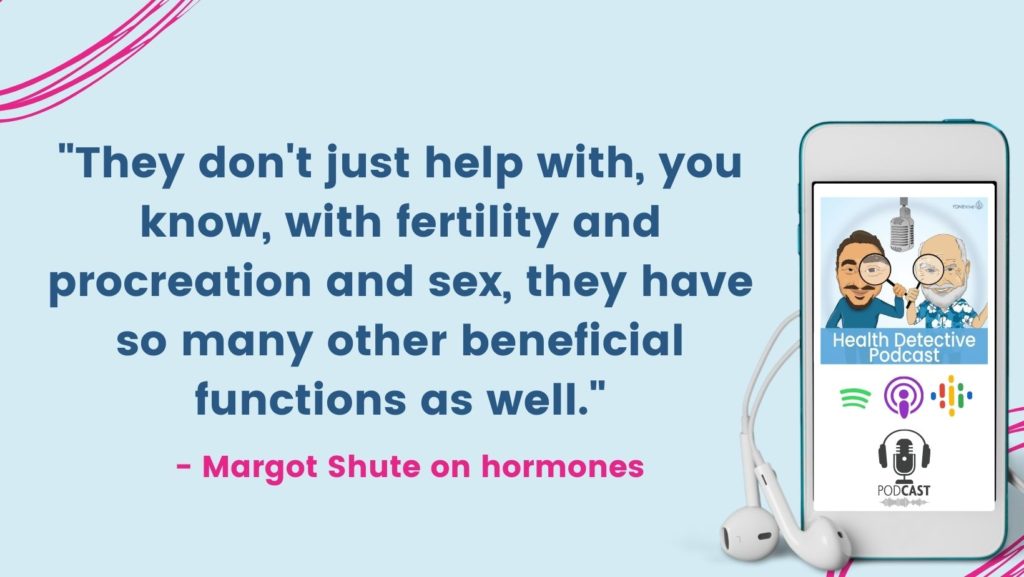
They don’t just help with, you know, with fertility and procreation and sex, they have so many other beneficial functions as well. And with that, literally from brain health to bone health, to muscle health to so many things, I’m not going to go into all the details, but I’ll estrogen, progesterone.
Progesterone is the one that declines first, and then the estrogen comes afterwards and. And what happens with these when they tend to decline, we very vulnerable to having issues like poor bone health, provide density and our muscles start to atrophy where they’re not, they start, they’re not as strong and as robust as what they were before.
Exercise to Protect Your Body
So we have to be very careful to protect our muscles and we should not be doing things like heavy cardio, like pounding the pavement, doing the half marathons that we used to do, doing the soccer races, go to spin classes. Those were the worst. And I think that’s what depleted me with my cortisol is I was still doing those in my forties and we really need to start changing our approach to the way we needed to be lifting, doing more strength training to build up our muscle, build up too.
Because our muscles, at the end of the day, they also help with metabolism, and they actually also help to burn the fuel. And so by building muscle, you actually will burn the fat as opposed to just doing the cardio, which is cortisol. And the cortisol is the thing that causes you to hold onto fat.
So that is the approach. And also doing more quick bursts of high-intensity interval training. The research has shown that it’s actually far more beneficial in the way of creating more insulin sensitivity. And as I said, we are, there’s a tendency for us to be more insulin resistant when we get into our midlife years.
So those are the types of exercises. And the other one that we forget about is walking. It just daily walks or daily movement just being active, just there’s this acronym and I don’t, I know the name of the acronym, but don’t ask me to say the whole sentence. It’s N.E.A.T. and this is the, a new approach to exercise as well with midlife. N.E.A.T neat exercise. Something about thermogenesis is the last one. And it’s just little movements. Whether you. Parking your car, the furthest away from a grocery store, taking the stairs instead of the elevator. Just constant moving. Even gardening, things like that, those are the things we should be doing and whatever we do in the form of exercise, we should love I learned about this in my last course that I did it.
Exercise should not be called exercise. It’s a fun sweaty activity. Cause we want to sweat a bit, but we don’t have to go totally sweaty, but make it fun, make it something enjoyable. And even if it’s having a dance party in the kitchen with your kids. I love that. So that’s the new approach to exercise in midlife.
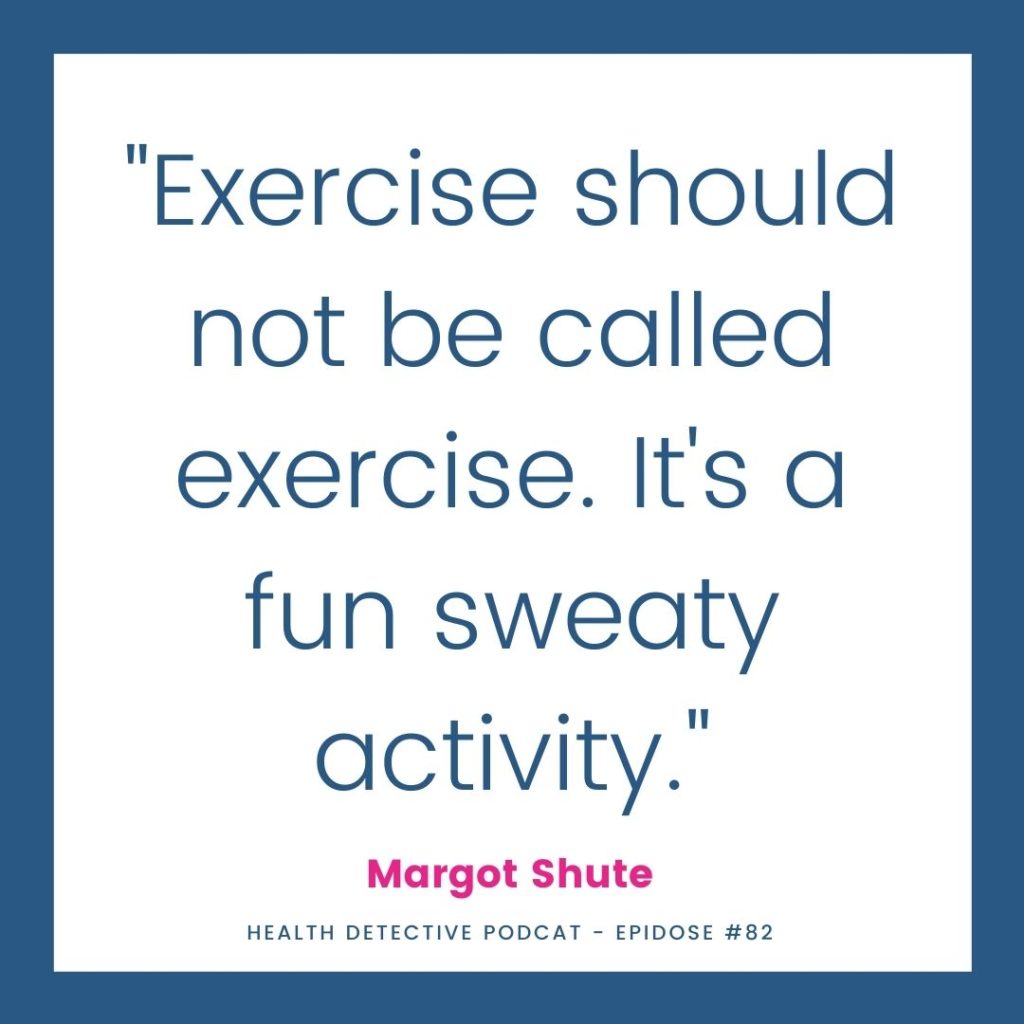
[00:48:39] Evan Transue: I love that.
I hadn’t looked that up myself. It actually stands for non-exercise activity and you are correct thermogenesis. So I think that’s cool. And I love the approach to exercise there because I it’s so funny. I’ve never, thankfully of all the things I’ve dealt with, I’ve never really had to deal with the weight gain thing, quite the opposite, actually.
I love keeping fitness and routine activities just fun as I get older because I am at the age. I mean, I’m a young guy, but I’m at the age where it’s like, no, I’m not playing competitive middle school and high school sports. And I dreaded those things anyway, to begin with at that age, I was not particularly good at those, but of course, I want to stay active for the rest of my life.
I never even think about it as exercise. I just do the things I love to do. And I do strength training and a few years back, I broke my foot and it really has been a hell of a journey trying to get this thing back in shape because it caused like, long story short, it healed all supinated, which caused this issue with my knee.
I got IT band syndrome, yada yada yada. And so recently after all these years, I’ve finally started screwing around in the gym. I was just there earlier today and I’m warming up with basketball for 10 minutes instead of doing the elliptical for 10 minutes. I mean, this is a significant difference how much joy that brings me to do biz basketballs, where I got my injury.
I haven’t really played in three, four years. I used to play multiple times a week for almost a decade. And it’s unbelievable to me how good I feel and how much enjoyment I have doing that. And I honestly work harder in those 10 minutes doing that then on the elliptical anyway, and the elliptical it’s like “10 minutes, dude. You can’t do it?”
Every time. Oh my God, I hate this. I don’t want to be doing this. And for other people, it’s like a fun thing. Right. They turn on like a show on something where they have a, those ellipticals where there’s like an interactive TV screen. So for some people, that’s the right thing. But like guys, there is enough exercise out there or forms of activity, I should say an exercise out there that you don’t have to be doing stuff you don’t like.
Stop falling into this dogmatic trap that it has to be one thing. Go do what you enjoy and also consider that N.E.A.T. stuff that non-exercise okay. Activity. Yeah. I had to look that up again because I understood what it was conceptually, but I forgot the acronym for a moment.
And yeah, I think that’s really important now, as we’re kind of wrapping up here, we’re going to go a little over time. It’s completely fine. One of the things that I wanted to make sure we got to is your kind of signature weight-loss method. And I feel like we’ve probably covered different pieces of this already within this podcast.
So my next question then would just be simply Margot, where can people find you if they’re interested in kind of, you’re really applying this method to their life and working with someone who’s been through it themselves?
How to Find Margot
[00:51:11] Margot Shute: I have a website it’s still being revamped at the moment, but they quite welcomed to go ahead and check it out.
It’s shuteforwellness.com and I’m also on social media at @shuteforwellness that’s Instagram. And I’m on Facebook, but I’m not very active on Facebook. I have a business page, but not much going on there. And so most of my activity is on Instagram
[00:51:35] Evan Transue: I want to, of course finish up with our signature question on this show. The one we always ask on the health detective podcast, and that is this. If Margot was given a magic wand, and you could get every single person in this world to do one thing for their health, or maybe get them to stop doing one thing, what is the one thing that you would get them to do?
[00:51:56] Margot Shute: Gosh, Evan that is hard. Just having one, one thing. I think in mid-life, So I’m going to kind of just narrow it in on mid-life just to make it a little easier. And by the time you get to midlife is that you have to pay attention to sleep, your sleep, your quality of your sleep and the timing of your sleep.
I know we haven’t even spoken about sleep. It’s not just about the weight, but I’ve just found that sleep is the healer of all healing modalities.
[00:52:30] Evan Transue: Oh, right. What a great episode, man? I, I said in the beginning in the intro, but I’ll just say it again. I have such a high level of respect and just gratitude, even for people who come on here and just pour their hearts out so openly and just are willing to say what they went through and things that happened to them all in the name of helping other people.
I feel like that’s what we need to start moving towards. And to be fair, I do think we are as a society. I think that’s one of the beautiful things of social media with all of its darkness that it has is that it’s brought to light so many issues that many of us would probably deal with in silence because you know, someone famous comes out and says it, or even a friend or family member has the courage to say something.
And that has a ripple effect, man. That’s a really good use for social media. And I know this isn’t directly social media per se, but certainly, it is, you know, a way of sharing information on the internet. And I think it’s amazing. I’m like how many people, even the person that I mentioned, you know, in the beginning of the podcast just don’t know that other people deal with this.
I mean, I know when I dealt with my mental health issues, I really thought I was alone. I didn’t get that so many other people dealt with this stuff and an analogy, or I don’t even know if it’s an analogy. An example I choose is like a comparison of someone breaking their arm when we are kids. And we’re in elementary, middle school and high school, we see broken arm or casts for broken arms all the time.
And so if you break your arm, I would imagine you don’t think it’s that strange? You’re just like, I’ve seen this before and I got to heal and get my stuff done, but do you see anxiety? Do you see depression? Do you see bulimia? Not usually. And so if you deal with those things, For the first time. I think it can be pretty confusing for those individuals because they’re thinking, wow, maybe I’m the only one who’s dealt with something like this.
So props to you Margot for everything that you’ve overcome. I mean, this has definitely been a heck of a long journey for you. And thank you for coming on and sharing. That means a lot. And you did a great job. Now guys, if you like this information in general and want more people to be able to hear it, please consider leaving us a five-star review on the Apple podcast.



